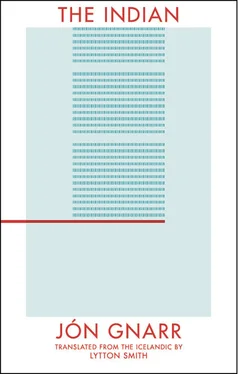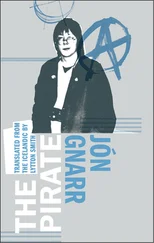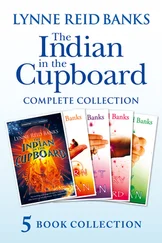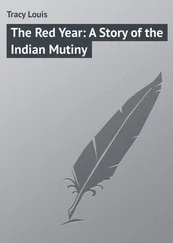The farmer’s wife is my aunt. She’s very strict.
When I first came to the farm, she was always asking me if I was mean to my grandmother and whether I didn’t think it was bad to be mean to my grandmother. I know that. But I’m not mean. Grandma and I are friends. We’re only playing. She enjoys it when I play around with her.
The farmer and his wife have two sons. Their names are Ingvi and Njörður.
Ingvi is the same age as me but Njörður is a teenager. He’s in the Youth Club and is very good at sports. He can jump as high as he is tall, without needing a run-up. There are also several other kids out there in the country, just like me. The farm is an ordinary house. Yet there’s a very weird smell there, the smell of animals.
Outside the house is a beautiful garden where the farmer’s wife grows flowers. Directly opposite the house, spread throughout the farmyard, are outbuildings: a cowshed, a sheep barn, another barn.
On the farm there’s a girl called Helga. Helga is the same age as me. She’s lots of fun. She’s not really a girl. Girls are so often prudes. But not Helga. She’s exactly like a boy. It’s fun to play with her.
We mostly play on the slope between the two farms. There’s a little house and some fences.
The kids in the country play differently than other kids. They don’t have Action Man. Instead, they play with ram’s horns and bones. The horns represent sheep. If you find an unmarked horn, you get to own it by marking it with a cut, the way it’s done with lambs in real life: when a lamb is born, a piece is cut from its ear and a special label is put on it. That’s how the farmer knows his sheep. It’s called a sheep-mark. The kids score their horns with their own unique sheep-mark. Some cut one piece, some more pieces than others can. The mark can also be a hole or a groove.
The kids keep their horns inside their homes during winter. In spring, they put all the horns together and throw them down a hill so that they scatter across a large meadow. Later in the summer, they act like shepherds. They walk across the field, looking in the tall grass and picking up their horns.
The bones are also animals. Cheekbones are cows. Sheep bones are horses. You put a yarn bundle around the bones and drag it behind you, between your feet. Small bones are dogs and cats.
I like playing these games. I don’t think they’re stupid. I could spend all day rooting around with farm toys, making roads, fixing the fence. Fences are made from poles and wires. There’s a skill to making a beautiful fence.
There’s a simple economic system on the slope. Business is conducted primarily through barter. Some things are more valuable than others and their value depends on supply and demand. What is rare is expensive and exciting. What there’s plenty of is worthless.
The formal currency on the slopes is the seed of Yellow Rattle, also called moneyflower. But since everyone has so many seeds, they’re actually worthless. They grow wild in the gravel through the valley.
I share the farm with Helga. We’re a farm couple. The boys tease me and call us sweethearts, though we aren’t. One boy tormented me by saying I’d kissed Helga. But it wasn’t true. I wouldn’t ever kiss her. I would rather drink a glass full of warm cow’s piss than kiss a girl. We’re just a farming couple who are trying to make our farm cool.
But we also play all sorts of other games. We play chase and hide-and-seek and make cars out of big cogs we mount on the end of a stick with a nail through the middle. Then we push the cogwheels in front of us, using the stick so they spin. We drive over obstacles and compete to make it to the cowshed, seeing how far we can go without getting stuck.
I don’t have to work much in the countryside. But I need to lend a hand. We’re made to help in the house on the farm. The vacuum cleaner frustrates me. I’m always told off for vacuuming badly. I try to do it as well as I can. When I’m done, the farmer’s wife comes over and points at the floor.
— It’s everywhere. This isn’t a job well done.
— But I vacuumed it all.
— Are you that lazy that you don’t try?
— No.
— Then you’re just bat-blind, boy. The floor is covered in crumbs and fluff.
She points all around. I have to bend right down to see the crumbs.
We also have to take care of the cows. They go out to a field after the morning milking. Then you need to fetch them back again at night. We take turns doing it. When you drive a cow, you use a lash. That’s a stick with a tie on it, like a whip. You never need to hit the cows because they walk of their own accord. But it’s fun to do the driving. You’re entrusted with a real status when you do this. It’s much better than shoveling shit.
The cows are great. They’re always quiet and look like they’re thinking very, very, very hard. I don’t reckon they think about anything other than grass. The cows are the only animals we need to care for.
In summer, the sheep are on the mountain. You don’t see much of them except when they sneak into the meadow. When that happens, we need to drive them back up the mountain.
Sheep are stinking creatures. They’re grumpy and run fast. They remind me of shy cats, which run away when they see someone, as if the person is going to hurt them.
There’re loads of dogs on the farm. The farmer breeds dogs and sells them. He is very strict with the dogs and trains them to become good sheepdogs. His dogs are highly sought after. His best dog is called Spot. He’s so good that he understands everything that’s said to him. If the sheep get into the farm, the farmer tells him what to do. He listens patiently and then runs off. He does everything right.
The couple on the farm are very religious. They believe in Jesus. I don’t believe in him. They’re always praying.
Everyone has to pray together in the morning and say the Lord’s Prayer in the evening. And you have to say grace before you can start eating. You must close your eyes and bow your head while praying.

We’re not allowed to swear in the country. If we do, we have to brush our teeth with soap. I swore a few times when I first arrived but I quickly stopped. It’s strange brushing your teeth with soap. The taste is disgusting. When I get home, I’m going to make Aunt Gunna brush her teeth with soap. She swears a lot. When she farts, she says: — Bloody hell, this damn gas!
The farming couple believe in God a lot. I don’t know anything about God except what Grandma has told me about him. She says he is very good and if you believe in him and are a good person you’ll go to heaven when you die.
Anton says there’s no life after death, that you just rot in a grave and become food for worms. I don’t know what’s true. I wonder why, if God exists, he never shows up. Is he hiding? What is he afraid of?
But I’ve never known so much praying. Once, we all had to kneel in front of a picture of Jesus that was hanging above the double bed. Then the farmer began to pray, asking God to stop the constant rain so they could sow seed. He spoke strangely, using words I’d never heard before. He spoke to God like he was his friend.
— We gather before you today, my Lord, for we are helpless in the face of the weather. You know the script of our hearts, O Lord, and our lives, and know how important it is for us to make hay. Therefore we ask you, dear Lord…
I started laughing. I tried to hold it in but I couldn’t. I thought it was so silly. They were upset and made me stay all alone inside my room for ages and I wasn’t allowed at tea.
The food in the country is generally nice. In the morning we get bread and porridge. It’s different eating in the country than I am used to at home. Like stirring. That’s thick yogurt— skyr —mixed with porridge. It doesn’t taste bad. At teatime, we often get klattar ; they’re like pancakes, but they’re made from leftover porridge. They’re tasty. Sometimes, though, there are things I can’t eat. I don’t eat lumpfish or soured lamb. I think moss-milk is disgusting. I’d rather not eat colostrum pudding. But I have to eat it if that’s what’s for dinner. I’m not allowed to get up from the table until I’m finished. It’s a good job there aren’t ever cucumbers.
Читать дальше



![О Генри - Бабье лето Джонсона Сухого Лога [The Indian Summer of Dry Valley, Johnson]](/books/407344/o-genri-babe-leto-dzhonsona-suhogo-loga-the-india-thumb.webp)









